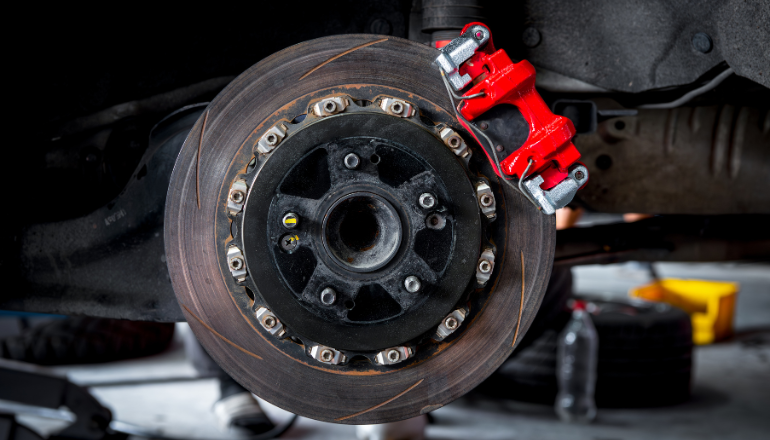Experiencing a shaking or vibrating sensation when applying the brakes can be unsettling and is often a sign that something isn’t right with your vehicle. This issue not only compromises your driving comfort but could also indicate underlying problems requiring immediate attention. In this blog, we’ll explore the common causes of car shaking while braking and why it’s important to address them promptly. If you’re experiencing this issue, it’s wise to consult a car brake specialist or trusted auto repair services.
Common Reasons Your Car Shakes When Braking
1. Warped Brake Rotors
Brake rotors play a crucial role in the braking system by providing the surface against which the brake pads press to slow the vehicle. Over time, these rotors can become warped due to excessive heat or uneven wear. Warped rotors cause the brake pads to grip unevenly, resulting in vibrations felt through the steering wheel or brake pedal.
Solution: Visit a reliable car brake service to have your rotors resurfaced or replaced, depending on their condition.
2. Worn-Out Brake Pads
Brake pads wear down over time, and if they’re too thin or uneven, they can cause vibrations when braking. Low-quality brake pads can also contribute to this problem, as they don’t provide consistent performance.
Solution: Replace the brake pads with high-quality ones to ensure smoother braking and longer-lasting performance.
3. Suspension or Steering Issues
While braking, components of the suspension or steering system can amplify vibrations if they are worn or damaged. For instance, loose tie rods or worn-out ball joints can contribute to shaking when decelerating.
Solution: Have a car mechanic inspect your suspension and steering systems to identify and fix any issues.
4. Wheel Alignment Problems
Improper wheel alignment can lead to uneven tire wear, which may cause vibrations during braking. Misaligned wheels also compromise the overall handling of your car.
Solution: Regularly schedule wheel alignment as part of your car services in Adelaide to maintain optimal driving performance.
5. Tire Issues
Damaged or unbalanced tires can cause your car to shake, especially when braking. Uneven tread wear or a bent wheel rim can also contribute to vibrations.
Solution: Inspect your tires for wear and damage and consider balancing or replacing them if necessary.
6. Sticking Brake Calipers
A sticking brake caliper can cause uneven pressure on the rotor, leading to shaking or pulling to one side while braking. This is often accompanied by a burning smell.
Solution: Consult an auto repair services provider to clean, repair, or replace the affected caliper.
Why You Shouldn’t Ignore the Problem
Ignoring vibrations when braking can lead to:
- Reduced braking efficiency, increasing the risk of accidents.
- Accelerated wear on other components like tires and suspension.
- Higher repair costs if the issue worsens over time.
Regular maintenance by a car brake specialist can help prevent these problems and ensure your safety on the road.
Trust Professional Auto Care Services
If your car shakes when braking, it’s time to seek help from trusted professionals. A qualified car mechanic can accurately diagnose the problem and provide effective solutions to restore your vehicle’s performance. For residents in Adelaide, comprehensive car brake service and repair are readily available at reputable workshops specializing in car services Adelaide.
Conclusion
Vibrations when braking are often a symptom of underlying mechanical issues that need immediate attention. By addressing problems like warped rotors, worn brake pads, or suspension issues, you can ensure your car remains safe and comfortable to drive. Don’t wait until minor issues become major headaches—consult a car brake specialist or visit an auto repair services center for expert assistance.





